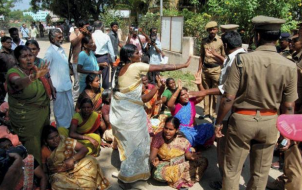
The conflict around the restart of a nuclear power plant in Tamil Nadu – which we introduced on our website on 29 February – has reached boiling point on Friday 23 March. While the authorities are really pushing hard to open the plant, people are also increasing their resistance. Approx. 20.000 protestors are blocking the plant, including around 8000 children. Police is now using all kinds of force to break the resistance, including taking away their water, food and milk for the children. Police personnel forcibly took away mobiles phones and water supply equipments. On Fridaymorning, police arrested 350 protestors and chief Vaiko, the leader of MDMK (Marumalarchi Dravida Munnetra Kazhagam) – a political party from the indigenous people in Tamil Nadu. Another leader, S.P. Udhayakumar, is facing charges of sedition and waging war against the country. Udhayakumar has been on an indefinite hunger strike ever since Tamil Nadu Chief minister J Jayalalithaa gave the go-ahead to start work at the plant earlier this week. Writers, artists, fisherman, construction laborers and journalists have all expressed solidarity with the protestors in Idinthakarai and will all go on hungerstrike at the headquarters of MDMK. The demonstrators said the police force should be withdrawn immediately and the decision on the plant should be revoked.
Anger against Tamil Nadu Chief Minister J. Jayalalithaa U-turn is spilling over to the streets across the whole of India on Friday, demanding an immediate halt to work at the Koodankulam nuclear power plant. Jayalalithaa’s decision to re-start work at the plant has come as a rude shock to anti-nuclear activists. She had supported protesters in the past going to the extent of taking up the case with the prime minister. There is a token hunger strike planned in New Delhi in the afternoon, where activist Medha Patkar is expected to join. Other places of protest include Chandigarh, Hisar, Fatehbad, Jind and Bhiwani in (Haryana), Kanpur and Lucknow (Uttar Pradesh), Ranchi (Jharkhand), Indore (Madhya Pradesh), Ahmedabad, Pune and Kolkata. The battle against nuclear energy is fast spreading all over the Indian subcontinent. The stakes are big, as Indians today see the nightmare of a police state enforcing nuclear power against the will of the people folding out under their eyes. Calls have been made from India to protest at the Embassy of India in the state you are living in, or send sms or emails to ask them to immediately stop all work at the Koodankulam nuclear power plant.
As we write, an unconfirmed report comes in that up to 2000 persons have been arrested in a major escalation of the conflict. Stay tuned at https://twitter.com/#!/EnvJustice for more news.

The project ENVJUSTICE has received funding from the European Research Council (ERC) under the European Union’s Horizon 2020 research and innovation programme (grant agreement No. 695446)